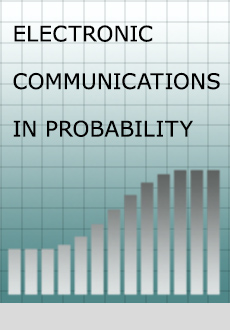Abstract
Consider the stochastic heat equation $\dot{u} =\frac 12 u''+\sigma (u)\xi $ on $(0\,,\infty )\times \mathbb{R} $ subject to $u(0)\equiv 1$, where $\sigma :\mathbb{R} \to \mathbb{R} $ is a Lipschitz (local) function that does not vanish at $1$, and $\xi $ denotes space-time white noise. It is well known that $u$ has continuous sample functions [22]; as a result, $\lim _{t\downarrow 0}u(t\,,x)= 1$ almost surely for every $x\in \mathbb{R} $.
The corresponding fluctuations are also known [14, 16, 20]: For every fixed $x\in \mathbb{R} $, $t\mapsto u(t\,,x)$ looks locally like a fixed multiple of fractional Brownian motion (fBm) with index $1/4$. In particular, an application of Fubini’s theorem implies that, on an $x$-set of full Lebesgue measure, the short-time behavior of the peaks of the random function $t\mapsto u(t\,,x)$ are governed by the law of the iterated logarithm for fBm, up to possibly a suitable normalization constant. By contrast, the main result of this paper claims that, on an $x$-set of full Hausdorff dimension, the short-time peaks of $t\mapsto u(t\,,x)$ follow a non-iterated logarithm law, and that those peaks contain a rich multifractal structure a.s.
Large-time variations of these results were predicted in the physics literature a number of years ago and proved very recently in [10, 11]. To the best of our knowledge, the short-time results of the present paper are observed here for the first time.
Citation
Jingyu Huang. Davar Khoshnevisan. "On the multifractal local behavior of parabolic stochastic PDEs." Electron. Commun. Probab. 22 1 - 11, 2017. https://doi.org/10.1214/17-ECP86
Information





